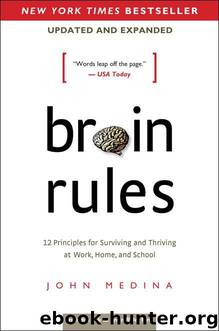Brain Rules (Updated and Expanded): 12 Principles for Surviving and Thriving at Work, Home, and School by John Medina

Author:John Medina
Language: eng
Format: mobi
ISBN: 9780996032605
Publisher: Pear Press
Published: 2014-04-21T14:00:00+00:00
After encoding, working memory kicks in
What happens to declarative information after those first few moments of encoding? We have the ability to hold it in our memory for a little while.
For many years, textbooks described this process using a metaphor involving cranky dockworkers, a large bookstore, and a small loading dock. An event to be processed into memory was likened to somebody dropping off a load of books onto the dock. If a dockworker hauled the load into the vast bookstore, it became stored for a lifetime. Because the loading dock was small, only a few loads could be processed at any one time. If someone dumped a new load of books on the dock before the previous ones were removed, the cranky workers simply pushed the old ones over the side.
Nobody uses this metaphor anymore. Short-term memory, we now know, is a much more active, much less sequential, far more complex process than that. Short-term memory is a collection of temporary memory capacities—busy work spaces where the brain processes newly acquired information. Each work space specializes in processing a specific type of information: auditory information, visual information, stories—plus a “central executive” to keep track of the activities of the others. These all operate in parallel. To reflect this multifaceted talent, short-term memory is now called working memory. The best way to explain working memory is to watch it in action. I can think of no better illustration than the professional chess world’s first real rock star: Miguel Najdorf.
Rarely was a man more at ease with his greatness than Najdorf. He was a short, dapper fellow gifted with a truly enormous voice, and he had an annoying tendency to poll members of his audience on how they thought he was doing. Najdorf in 1939 traveled to a competition in Buenos Aires with the national team. Two weeks later, Germany invaded Najdorf’s home country of Poland. Unable to return, Najdorf rode out the Holocaust tucked safely inside Argentina. He lost his parents, four brothers, and his wife to the concentration camps. Partly in hopes that any remaining family might read about it and contact him (and partly as a publicity stunt), he once played 45 games of chess simultaneously. He won 39 of these games, drew four, and lost two. While that is amazing in its own right, the truly phenomenal part is that he played all 45 games in all 11 hours blindfolded. You did not read that wrong. Najdorf never physically saw any of the chessboards or pieces; he played each game in his mind.
Several components of working memory were operating simultaneously in Najdorf’s brain to allow him to do this. Najdorf’s opponents verbally declared their chess moves. The work space assigned to linguistic information (called the phonological loop) allowed him to temporarily retain this auditory information.
To make his own chess move, Najdorf would visualize what each board looked like. The work space assigned to images and spatial input (called the visuospatial sketch pad) kicked in and allowed him to temporarily retain this visual information.
Download
This site does not store any files on its server. We only index and link to content provided by other sites. Please contact the content providers to delete copyright contents if any and email us, we'll remove relevant links or contents immediately.
The Art of Thinking Clearly by Rolf Dobelli(10490)
Mindhunter: Inside the FBI's Elite Serial Crime Unit by John E. Douglas & Mark Olshaker(9346)
Change Your Questions, Change Your Life by Marilee Adams(7786)
Nudge - Improving Decisions about Health, Wealth, and Happiness by Thaler Sunstein(7711)
Mastermind: How to Think Like Sherlock Holmes by Maria Konnikova(7351)
The Power of Now: A Guide to Spiritual Enlightenment by Eckhart Tolle(5788)
Men In Love by Nancy Friday(5246)
Altered Sensations by David Pantalony(5106)
Factfulness: Ten Reasons We're Wrong About the World – and Why Things Are Better Than You Think by Hans Rosling(4745)
The Confidence Code by Katty Kay(4265)
Thinking in Bets by Annie Duke(4229)
Man and His Symbols by Carl Gustav Jung(4138)
The Worm at the Core by Sheldon Solomon(3489)
Why Buddhism is True by Robert Wright(3458)
Liar's Poker by Michael Lewis(3452)
Three Women by Lisa Taddeo(3436)
The Inner Life of Animals by Peter Wohlleben(3321)
Descartes' Error by Antonio Damasio(3280)
How Music Works by David Byrne(3272)
